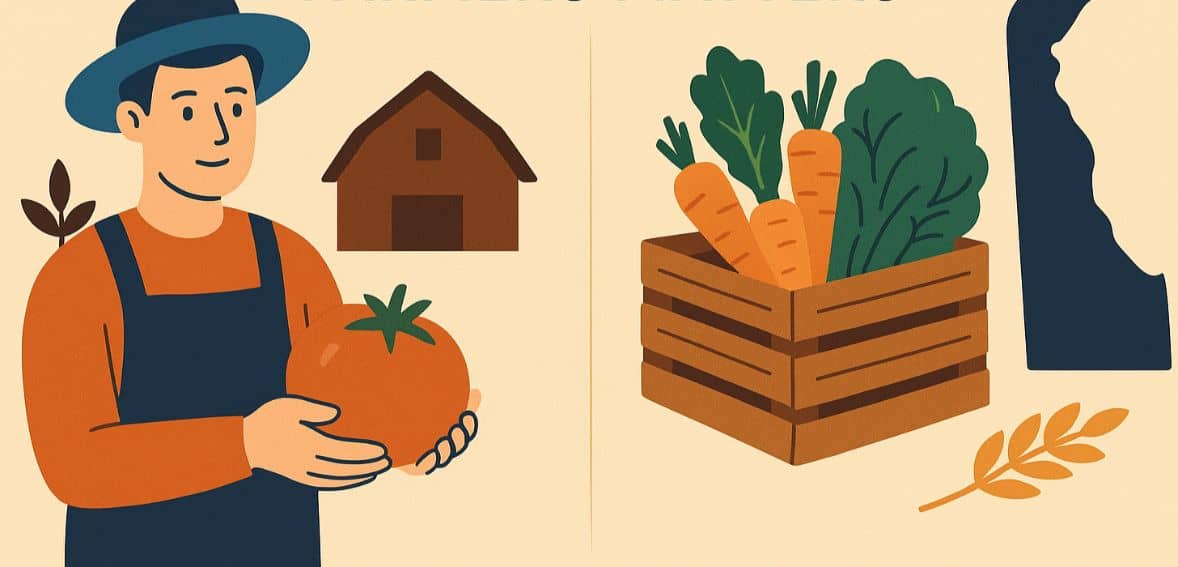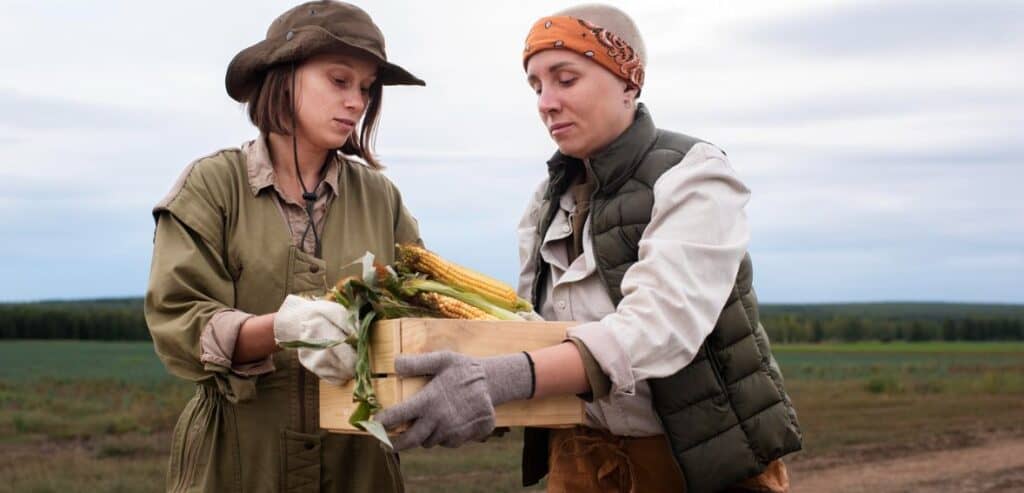
The Rise of Local Ingredients: Why Supporting Delaware Farmers Matters
Local Ingredients The way that people think about food has changed significantly in the past decade. This shift is particularly apparent in Delaware, a small state with a strong agricultural heritage. At farmers’ markets, eateries, and supermarkets, more locals are selecting ingredients because they value not only the food’s freshness but also its origins.
This movement represents a growing commitment to sustainability, community, and economic resilience, and it goes far beyond taste. Supporting regional farmers improves relationships between people and place while preserving farmland, generating employment, and lessening the impact on the environment.
As Delaware adopts this change, it becomes evident that supporting local businesses is an investment in the future of the state rather than just a passing trend.
A Growing Appetite for Local Food

The desire for local food is not coincidental. There has been a cultural awakening about food and its origins throughout the nation, but especially in Delaware. Customers are now more conscious of the health hazards associated with lengthy supply chains and excessively processed goods.
They prefer products that are nutrient-dense, fresh, and maintain their integrity and flavor. Farmers who have embraced both tradition and innovation are meeting this demand for Delaware residents by producing a wide variety of ingredients, including fresh dairy, poultry, vegetables, specialty crops, corn, and soybeans.
Farmers’ markets in Wilmington, Dover, Newark, and other towns have developed into vibrant hubs for social interaction, education, and shopping. Direct communication between farmers and consumers promotes appreciation, openness, and trust. Purchasing locally is about more than just the final product; it’s also about appreciating the work that goes into growing food and understanding the process.
This trend has also been adopted by Delaware chefs and restaurateurs, who incorporate regional flavors into their menus and highlight the bounty of the state’s agriculture with seasonal dishes.
Authenticity is at the core of this appetite for regional cuisine. Food has evolved into a physical means of reestablishing a connection with one’s heritage in a time when a large portion of life is digital and remote. Delawareans are embracing a philosophy of eating closer to the land and helping those who sustain it, rather than just purchasing chicken or carrots.
The Economic Power of Supporting Delaware Farmers
Economics is one of the best arguments for using local ingredients. Delaware’s economy still depends heavily on agriculture, which directly and indirectly supports thousands of jobs. More money stays in the community when consumers buy locally grown food.
Spending on Delaware farms creates jobs, boosts business growth, and generates tax revenue that supports public infrastructure, in contrast to spending on imported goods that go to other states or nations.
Delaware schools are increasingly incorporating local food into their cafeterias. This effort not only promotes healthier diets but also addresses broader issues such as food security, ensuring that fresh food reaches families in need.
Rural communities are stabilized when local farmers are supported. In many areas of Delaware, farming has been a way of life for generations and is more than just a job. By supporting these farmers, locals contribute to farmland maintenance, tradition preservation, and the preservation of agricultural knowledge.
Small and medium-sized farms risk being outcompeted by industrial operations in the absence of consumer support, which could drastically change the agricultural identity of the state. Small businesses also benefit economically.
Locally sourced ingredients give eateries, breweries, bakeries, and food artisans a distinct competitive advantage. Their products and menus are notable for being more sustainable, fresher, and community-focused. As a result, they draw in more clients who are looking for an experience that is deeply ingrained in Delaware culture in addition to a meal.
A Healthier Choice for Families

Health is yet another strong argument for the importance of using local ingredients. Food frequently loses a significant amount of its freshness and nutritional value during the thousands of miles it travels before arriving on a plate.
Meats can be frozen for weeks, fruits and vegetables can be picked early to withstand transportation, and preservatives are frequently added to extend shelf life. In contrast, local produce is picked when it is at its ripest and gets to the customer fast. This results in fewer artificial additives, more nutrients, and more flavor.
Purchasing food from Delaware farms guarantees access to fresher, frequently more responsibly grown food for families looking to eat healthier. Many farmers in the area use fewer pesticides, organic practices, or regenerative farming methods, which help to soil health and biodiversity.
Diets rich in locally grown, fresh foods are especially beneficial for children. Children learn about the origins of their food when families shop together at farmers’ markets, which encourages better eating habits and a greater appreciation for agriculture.
In an effort to help students make the connection between community support and nutrition, Delaware schools are increasingly incorporating local food into their cafeterias. Promoting healthier eating habits by providing access to local ingredients is not only a lifestyle choice, but also a public good in a state where public health is a top priority.
Environmental Benefits of Eating Local
There is also a strong environmental argument in favor of Delaware farmers. Transportation, refrigeration, and packaging play a major role in the energy-intensive modern food supply chains. It takes a lot of fuel to transport a tomato from California or Mexico to Delaware, which results in carbon emissions that fuel climate change.
However, using local ingredients significantly lessens this impact. Shorter transit routes result in lower emissions and energy use. Additionally, Delaware farmers are more likely to have a strong concern for the land’s long-term health.
They have a direct stake in sustainability, water quality, and soil conservation because they work and live in the same communities where their food is consumed. To guarantee that their land continues to be productive for future generations, many farms use environmentally friendly pest control techniques, crop rotation, and cover crops.
Supporting local farmers also contributes to the preservation of open spaces. Unchecked urban sprawl is prevented by the productive use and maintenance of farmland. Preservation of green space is essential for preserving both community character and environmental balance in a state as small as Delaware.
Also Read: Top 10 Best Restaurants in Delaware for 2025
Why Local Ingredients Taste Better

Chefs and home cooks alike insist that local ingredients just taste better, and for good reason. Freshness and ripeness play a major role. Picked too early for transportation, the flavor of the produce never fully develops. Local fruits and vegetables, on the other hand, are frequently harvested 24 to 48 hours after they are sold, so they arrive in your kitchen at their best.
Local cuisine has a distinct “terroir” that goes beyond freshness. Similar to how different parts of the world produce wine with distinct profiles, Delaware’s soil and climate give crops distinct flavors.
You are experiencing a taste that is unique to Delaware when you eat local corn or strawberries. That connection to place is not only culinary—it’s cultural. Supporting local farmers preserves these flavors for future generations.
Building Community Connections Through Food

Building community is one of the most overlooked yet significant advantages of assisting Delaware farmers. Farmers’ markets are hubs for connection, storytelling, and interaction rather than just transactions.
Customers learn cooking techniques straight from the source, meet the people who grow their food, and hear about difficulties encountered during the season. By removing obstacles between producer and consumer, this direct communication promotes a sense of purpose.
Meeting the families who appreciate their produce makes farmers feel appreciated, and consumers learn to appreciate the labor-intensive nature of farming. The food system is made more human by these exchanges, which turn it from a faceless supply chain into a network of genuine connections.
Locally sourced food also makes restaurants cultural ambassadors. If you’re looking to explore regional flavors, check out some of Delaware’s must-try local restaurants for an authentic dining experience. The seasons and the surrounding landscape are reflected in the menus that customers enjoy.
The meal gains a narrative that enhances the dining experience when a chef explains that tonight’s special includes oysters harvested in the Delaware Bay or tomatoes grown in Kent County. Food becomes more than just a source of food; it becomes a link to local pride and cultural heritage.
The Challenges Farmers Face
Despite the obvious advantages of purchasing locally, Delaware farmers continue to face challenges that threat their survival. Small farmers may find it challenging to compete on price due to competition from large-scale agribusiness.
Climate change has made weather events more unpredictable, which can destroy crops and lower yields. Another challenge is obtaining land and funding, especially for young or inexperienced farmers who want to continue the tradition.
Additionally, local goods might be marginally more costly to consumers than mass-produced substitutes, which could discourage steady support. But it’s crucial to understand that these prices represent higher-quality food, sustainable practices, and fair labor.
Customers are investing in sustainability and resilience rather than low-cost, temporary solutions when they support local farmers. In response to some of these issues, Delaware has backed agricultural programs, grants, and cooperatives that assist farmers in reaching new markets and implementing cutting-edge methods.
In addition to giving families regular access to fresh produce, community-supported agriculture (CSA) programs allow consumers to purchase shares of a farm’s harvest, giving farmers a reliable source of income.
Conclusion
In the end, the popularity of local ingredients in Delaware is about more than just food; it’s about creating a sustainable future. Purchasing from nearby farmers helps preserve farmland, encourages local companies, and guarantees that the state’s agricultural customs will endure for many more generations.
Every purchase made at a farmers’ market or restaurant turns into a pledge to the environment, human health, and the unique identity of Delaware. Choosing local is a personal and community-driven choice that keeps money in the state and strengthens ties between people and place in today’s globalized society.
Farmers in Delaware are stewards of the land and protectors of the welfare of the community in addition to being producers. It is not only beneficial but also necessary to support them.